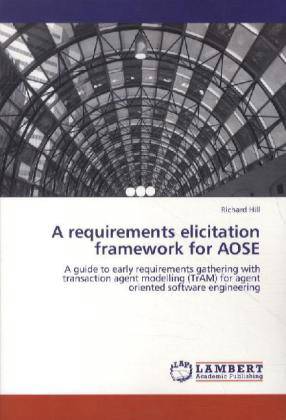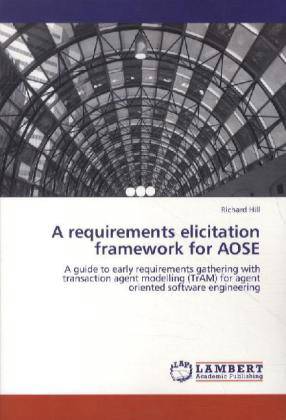
- Afhalen na 1 uur in een winkel met voorraad
- Gratis thuislevering in België vanaf € 30
- Ruim aanbod met 7 miljoen producten
- Afhalen na 1 uur in een winkel met voorraad
- Gratis thuislevering in België vanaf € 30
- Ruim aanbod met 7 miljoen producten
Zoeken
A requirements elicitation framework for AOSE
A guide to early requirements gathering with transaction agent modelling (TrAM) for agent oriented software engineering
Richard Hill
Paperback | Engels
€ 77,95
+ 155 punten
Omschrijving
This research monograph examines the difficulties of gathering and expressing requirements for agent based systems, and describes the development of an agent oriented requirements elicitation framework. Conceptual modelling in the form of Conceptual Graphs is offered as a means of representing the constituent parts of an agent based system. In particular, use of a specific graph, the Transaction Model, illustrates how complex agent concepts can be modelled and tested prior to detailed design specification. Using an exemplar in the healthcare domain, a design framework is developed showing how the Transaction Agent Modelling (TrAM) approach assisted the design of complex community healthcare payment models. Insight gained during the design process is used to enrich and refine the framework in order that detailed ontological specifications can be constructed, before validating with a mobile learning scenario. The ensuing discussion evaluates how useful the approach is, and demonstrates a number of significant contributions for early requirements gathering in Agent Oriented Software Engineering (AOSE).
Specificaties
Betrokkenen
- Auteur(s):
- Uitgeverij:
Inhoud
- Aantal bladzijden:
- 268
- Taal:
- Engels
Eigenschappen
- Productcode (EAN):
- 9783848486571
- Verschijningsdatum:
- 18/04/2012
- Uitvoering:
- Paperback
- Formaat:
- Trade paperback (VS)
- Afmetingen:
- 152 mm x 229 mm
- Gewicht:
- 394 g

Alleen bij Standaard Boekhandel
+ 155 punten op je klantenkaart van Standaard Boekhandel
Beoordelingen
We publiceren alleen reviews die voldoen aan de voorwaarden voor reviews. Bekijk onze voorwaarden voor reviews.











